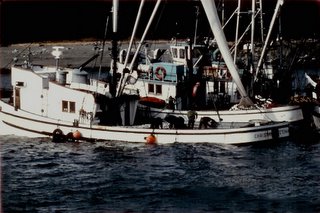A Bite out of the Food Chain
Several articles surfaced at the same time on critical components of the marine food chain, and the attacks on these components. I'm referring to herring and krill. Krill being small shrimp-like animals that will swim up the water column to the surface, where shrimp stay near or on the bottom. I've seen the Petersburg harbor full of krill sometimes, and everything imaginable feeding on them. That was the time I climbed down the dock ladder and grabbed a pollack out of the water with one hand. I also took the opportunity to cast a spinner out my kitchen window at my cannery apartment and haul in a cod just to say I did it.
Krill are very important and the reason I can say I caught breakfast out the kitchen window. But I had heard somewhere along the line how they fished for krill in the Antarctic, and it worried the tar out of me. We think pollack nets that are as big as football fields are big. These babies make those look like a butterfly net. Then I heard they pump out the cod end while they are towing and process the krill continuously as they catch them.
Then they feed them to fish in net pens. I also just read that there are 40 cod pen applications pending in British Columbia. The first ocean aquaculture is coming on line in Hawaii. And what else is scary today? The demise of the herring fishery below Ketchikan. What a burn, I helped start that fishery.
But the real issue is whether you really want a void in the food chain. Now, maybe you can do that in the Antarctic and get away with it because you don't have salmon and other human food up the food chain. But on the West Coast you have every commercial fishery there is relying on those components of the marine food web. I really hope Congress does mandate a ecosystem approach to fisheries managemen t.
t.
As I was writing this post, I saw an article about Leland Daniels' son who is a fishmonger in the oldest public market in the country: the Pike Place Market in Seattle. Leland was the tenderman for a gillnet co-op that my brother Steve helped start out of Ketchikan. They had Leland running fish to Seattle like a shuttle bus. That takes energy. Now his son is in the high energy business of selling fish to tourists. Like father, like son.
This was Leland's boat, the "Christian," with a load of herring.
When Leland gave me Jon's card half a dozen years ago and told me what he was doing, it really sounded like a fit. There are a lot of things to do in the fishing business, and when it's a fit it's obvious, and when it's not a fit, that's obvious too. When you have fish stocks crashing all around, you just know a lot of square pegs are trying to be pounded into round holes. Try four crab stocks in Alaska, the shrimp, the pacific ocean perch, and I don't know how many herring stocks.
Krill are very important and the reason I can say I caught breakfast out the kitchen window. But I had heard somewhere along the line how they fished for krill in the Antarctic, and it worried the tar out of me. We think pollack nets that are as big as football fields are big. These babies make those look like a butterfly net. Then I heard they pump out the cod end while they are towing and process the krill continuously as they catch them.
Then they feed them to fish in net pens. I also just read that there are 40 cod pen applications pending in British Columbia. The first ocean aquaculture is coming on line in Hawaii. And what else is scary today? The demise of the herring fishery below Ketchikan. What a burn, I helped start that fishery.
But the real issue is whether you really want a void in the food chain. Now, maybe you can do that in the Antarctic and get away with it because you don't have salmon and other human food up the food chain. But on the West Coast you have every commercial fishery there is relying on those components of the marine food web. I really hope Congress does mandate a ecosystem approach to fisheries managemen
 t.
t.As I was writing this post, I saw an article about Leland Daniels' son who is a fishmonger in the oldest public market in the country: the Pike Place Market in Seattle. Leland was the tenderman for a gillnet co-op that my brother Steve helped start out of Ketchikan. They had Leland running fish to Seattle like a shuttle bus. That takes energy. Now his son is in the high energy business of selling fish to tourists. Like father, like son.
This was Leland's boat, the "Christian," with a load of herring.
When Leland gave me Jon's card half a dozen years ago and told me what he was doing, it really sounded like a fit. There are a lot of things to do in the fishing business, and when it's a fit it's obvious, and when it's not a fit, that's obvious too. When you have fish stocks crashing all around, you just know a lot of square pegs are trying to be pounded into round holes. Try four crab stocks in Alaska, the shrimp, the pacific ocean perch, and I don't know how many herring stocks.


0 Comments:
Post a Comment
<< Home